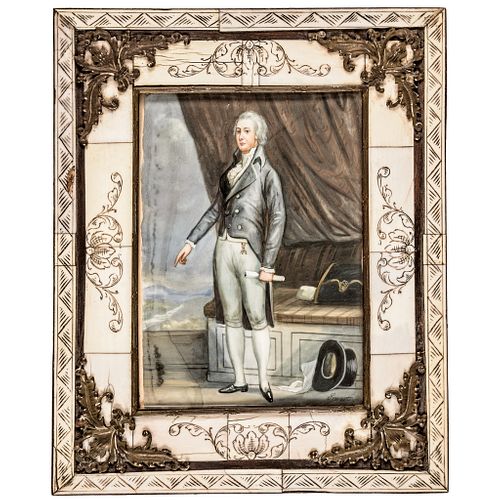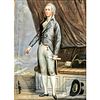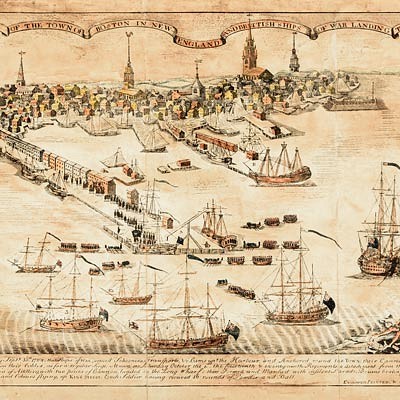William Pitt the Younger Miniature Watercolor of the 1783 British Prime Minister
Lot 189
Categories
Estimate:
$2,200 - $2,800
Absentee vs Live bid
Two ways to bid:
- Leave a max absentee bid and the platform will bid on your behalf up to your maximum bid during the live auction.
- Bid live during the auction and your bids will be submitted real-time to the auctioneer.
Bid Increments
| Price | Bid Increment |
|---|---|
| $0 | $10 |
| $200 | $20 |
| $300 | $25 |
| $500 | $50 |
| $1,000 | $100 |
| $2,000 | $200 |
| $3,000 | $250 |
| $5,000 | $500 |
| $10,000 | $1,000 |
| $20,000 | $2,000 |
| $30,000 | $2,500 |
| $50,000 | $5,000 |
| $100,000 | $10,000 |
| $200,000 | $20,000 |
| $300,000 | $25,000 |
| $500,000 | $50,000 |
About Auction
By Early American History Auctions
Mar 20, 2021
Set Reminder
2021-03-20 12:00:00
2021-03-20 12:00:00
America/New_York
Bidsquare
Bidsquare : Autographs-Colonial-Political-Americana
https://www.bidsquare.com/auctions/early-american-history-auctions/autographs-colonial-political-americana-6509
330 Lots of Rare, Historic Autographs, Americana, Civil War Era, George Washington, Abraham Lincoln, Slavery & Black History, Revolutionary War Era, Colonial America, Federal Period, War of 1812, Colonial Currency, Indian Peace Medals & more... Early American History Auctions auctions@earlyamerican.com
330 Lots of Rare, Historic Autographs, Americana, Civil War Era, George Washington, Abraham Lincoln, Slavery & Black History, Revolutionary War Era, Colonial America, Federal Period, War of 1812, Colonial Currency, Indian Peace Medals & more... Early American History Auctions auctions@earlyamerican.com
- Lot Description
American Revolution
Miniature Portrait of William Pitt the Younger the 1783 Late Revolutionary War Era British Prime Minister
c. Early to mid 19th century, Hand-Painted Miniature Watercolor Portrait of William Pitt the Younger (1759-1806), Statesman and late Revolutionary War Era British Prime Minister (1783), active in the late 18th and early 19th centuries, Choice Extremely Fine.
This superb quality original Watercolor Portrait of a handsome William Pitt the Younger measures about 3.75" x 5.5", ornately engraved inset bone frame to an overall size of 6.75" x 8.25". Image shows Pitt standing with a rolled up paper in his left hand and his right hand pointing to something below. Artist signed at bottom right corner "Smart". This painting is bright, fresh and vivid colors with exceptional sharp detail in all aspects and facial expression having just some minor water traces along left edge. One of Pitt's most important accomplishments was a rehabilitation of the nation's finances after the American War of Independence. Pitt also was Chancellor of the Exchequer for most of his time as Prime Minister, and helped manage the mounting British national debt, and made changes to the tax system in order to improve its capture of revenue. A historical painting with excellent quality which is ready to hang on display.
William Pitt the Younger (1759 - 1806) was a prominent British Tory Statesman of the late 18th and early 19th centuries. He became the youngest British prime minister in 1783 at the age of 24. He left office in 1801, but was Prime Minister again from 1804 until his death in 1806.
He was Chancellor of the Exchequer for most of his time as Prime Minister. He is known as "the Younger" to distinguish him from his father, William Pitt, 1st Earl of Chatham, called William Pitt the Elder or simply "Chatham", who had previously served as Prime Minister.
The younger Pitt's prime ministerial tenure, which came during the reign of George III, was dominated by major events in Europe, including the French Revolution and the Napoleonic Wars. Pitt, although often referred to as a Tory, or "new Tory", called himself an "independent Whig" and was generally opposed to the development of a strict partisan political system.
He led Britain in the great wars against France and Napoleon. Pitt was an outstanding administrator who worked for efficiency and reform, bringing in a new generation of outstanding administrators. He raised taxes to pay for the great war against France and cracked down on radicalism. To meet the threat of Irish support for France, he engineered the Acts of Union 1800 and tried (but failed) to get Catholic emancipation as part of the Union. He created the "new Toryism", which revived the Tory Party and enabled it to stay in power for the next quarter-century.
The historian Asa Briggs argues that his personality did not endear itself to the British mind, for Pitt was too solitary and too colourless, and too often exuded superiority. His greatness came in the war with France. Pitt reacted to become what Lord Minto called "the Atlas of our reeling globe". His integrity and industry and his role as defender of the threatened nation allowed him to inspire and access all the national reserves of strength. William Wilberforce said that, "For personal purity, disinterestedness and love of this country, I have never known his equal."
Historian Charles Petrie concludes that he was one of the greatest prime ministers "if on no other ground than that he enabled the country to pass from the old order to the new without any violent upheaval ... He understood the new Britain." For this he is ranked highly amongst British Prime Ministers.
Our Auction Contents:
Black History & Slavery: (Lots 1 - 63)
Abraham Lincoln Related: (Lots 64 - 74)
Historic Autographs: (Lots 75 - 235)
Colonial America: (Lots 236 - 261)
Revolutionary War: (Lots 262 - 304)
George Washington Related: (Lots 305 - 306)
Early American Guns & Weapons: (Lots 307 - 318) - Shipping Info
-
Early American provides in-house worldwide shipping. Please contact us directly if you have questions about your specific shipping requirements.
-
- Buyer's Premium



 EUR
EUR CAD
CAD AUD
AUD GBP
GBP MXN
MXN HKD
HKD CNY
CNY MYR
MYR SEK
SEK SGD
SGD CHF
CHF THB
THB













